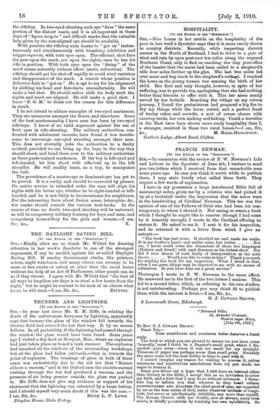THUNDER AND LIGHTNING.
[TO THE EDITOR OF THE " SPECTATOR:1
SIR,—In your last issue Mr. K. M. Iliffe, in relating the death of the unfortunate ferryman by lightning, apparently says that because the glass of the window fell inwards, the electric fluid had entered the but that way. It by no means follows. In all probability, if the lightning had passed through the window, the glass would have been fused. Some years ago I visited a dry dock at Newport, Mon., where an explosion had just taken place on board a tank steamer. The explosion had smashed all the windows of the surrounding workshops, but all the glass had fallen outwards,—that is, towards the point of explosion. The breakage of glass in both of these cases was undoubtedly due to the old law that "Nature abhors a vacuum," and in the Oxford case the electric current rushing through the but had produced a vacuum, and the pressure of air being greater outside, the glass was pushed in. Mr. Iliffe does not give any evidence in support of his statement that the lightning was attracted by a brass button, and I should myself very much doubt if this was the case.—
I ad', Sir, &c., Huan L. P. LOWE. Blagcron House, Stoke Bishop.


















































 Previous page
Previous page